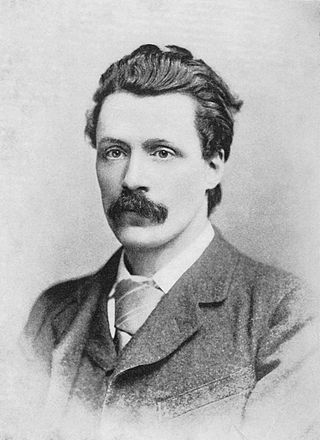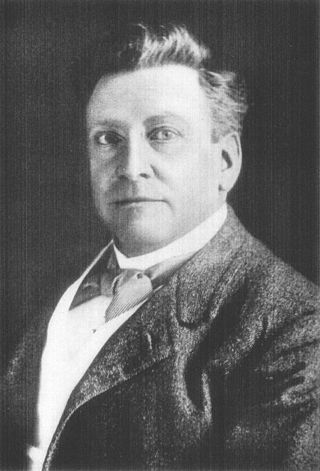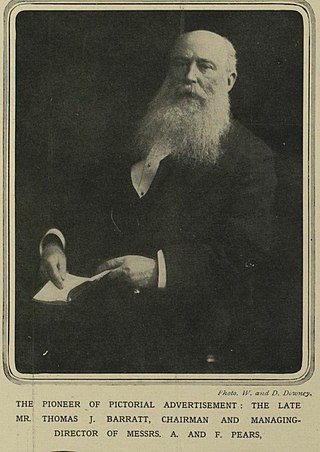
Isleworth is a suburban town located within the London Borough of Hounslow in West London, England. It lies immediately east of the town of Hounslow and west of the River Thames and its tributary the River Crane. Isleworth's original area of settlement, alongside the Thames, is known as 'Old Isleworth'. The north-west corner of the town, bordering on Osterley to the north and Lampton to the west, is known as 'Spring Grove'.

George Robert Gissing was an English novelist, who published 23 novels between 1880 and 1903. In the 1890s he was considered one of the three greatest novelists in England, and by the 1940s he had been recognised as a literary genius. Gissing's best-known works have reappeared in modern editions. They include The Nether World (1889), New Grub Street (1891) and The Odd Women (1893). He retains a small but devoted group of followers.

Mevagissey is a village, fishing port and civil parish in Cornwall, England, United Kingdom. The village is situated approximately five miles (8 km) south of St Austell. The parish population at the 2011 census was 2,015, whereas the ward population at the same census was 4,354.

Frank Bernard Wearne VC was an English recipient of the Victoria Cross, the highest and most prestigious award for gallantry in the face of the enemy that can be awarded to British and Commonwealth forces.

William Hesketh Lever, 1st Viscount Leverhulme, was an English industrialist, philanthropist, and politician. Educated at a small private school until the age of nine, then at church schools, he joined his father's wholesale grocery business in Bolton at the age of fifteen. Following an apprenticeship and a series of appointments in the family business, which he successfully expanded, he began manufacturing Sunlight Soap, building a substantial business empire with many well-known brands such as Lux and Lifebuoy. In 1886, together with his brother, James, he established Lever Brothers, which was one of the first companies to manufacture soap from vegetable oils, and which is now part of the British multinational Unilever. In politics, Lever briefly sat as a Liberal MP for Wirral and later, as Lord Leverhulme, in the House of Lords as a Peer. He was an advocate for expansion of the British Empire, particularly in Africa and Asia, which supplied palm oil, a key ingredient in Lever's product line. His firm had become associated with activities in the Belgian Congo by 1911.

Sir Francis Henry May was a British colonial administrator who served as Governor of Fiji from 1911 to 1912 and Governor of Hong Kong from 1912 to 1918.
Andrew Foulis was a Scottish printer, brother of Robert Foulis. They worked in partnership as printers to the University of Glasgow publishing many books in Latin and Greek.
Anthony Morris Jr. was a brewer, Quaker preacher, judge, and mayor of Philadelphia.

Abraham Abraham was an American businessman and the founder of the Brooklyn department store Abraham & Straus, founded 1865. The chain, which became part of Federated Department Stores, is now part of Macy's.

Thomas Fane, 8th Earl of Westmorland was an English politician and peer. He was an ancestor of the writer George Orwell.

Pears Glycerin soap is a British brand of soap first produced and sold in 1807 by Andrew Pears, at a factory just off Oxford Street in London. It was the world's first mass-market translucent soap. Under the stewardship of advertising pioneer Thomas J. Barratt, A. & F. Pears initiated a number of innovations in sales and marketing. English actress and socialite Lillie Langtry was recruited to become the poster-girl for Pears in 1882, and in doing so she became the first celebrity to endorse a commercial product.

Francis Barber, born Quashey, was the Jamaican manservant of Samuel Johnson in London from 1752 until Johnson's death in 1784. Johnson made him his residual heir, with £70 a year to be given him by trustees, expressing the wish that he move from London to Lichfield, Staffordshire, Johnson's native city. After Johnson's death, Barber did this, opening a draper's shop and marrying a local woman. Barber was also bequeathed Johnson's books and papers, and a gold watch. In later years he had acted as Johnson's assistant in revising his famous Dictionary of the English Language and other works. Barber was also an important source for James Boswell concerning Johnson's life in the years before Boswell himself knew Johnson.

Bubbles, originally titled A Child's World, is an 1886 painting by Sir John Everett Millais that became famous when it was used over many generations in advertisements for Pears soap. During Millais's lifetime, it led to widespread debate about the relationship between art and advertising.

Sir Lionel Phillips, 1st Baronet was a British-born South African financier, mining magnate and politician.

Thomas Luny (1759–1837), was an English artist who primarily painted seascapes and other marine-based works.

John Thomas Barber Beaumont (1774–1841) was a British army officer, painter, author, and philanthropist. He was successful in the insurance business, and projected a settlement in South America.

Thomas James Barratt (1841–1914) was an English businessman who was the chairman of the soap manufacturer A. & F. Pears. A pioneer of brand marketing, he has been called "the father of modern advertising".

Isleworth Cemetery is a cemetery in Isleworth, London Borough of Hounslow, in west London, England.

The history of advertising in Britain has been a major part of the history of its capitalist economy for three centuries. It became a major force as agencies were organized in the mid-19th century, using primarily newspapers and magazines. In the 20th century, It grew rapidly with new technologies, such as direct mail, radio, television. In the late 19th century, home-based British agencies were swallowed up and became branches of international firms, but London remains one of the world's most important advertising centers. Radical changes have come recently because of the new roles for the Internet and smart phones. For current conditions see Advertising.















